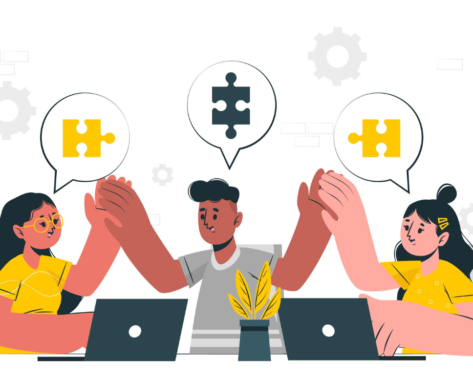LESSON OVERVIEW
The main objectives of this speaking lesson on teamwork are to:
- discuss teamwork by sharing experiences and opinions,
- watch a video about a teamwork psychometric test,
- assess teamwork tasks and dynamics in various contexts.
C2 / Proficiency45 min
60 minSpeaking ClassUnlimited Plan
Students talk about teamwork with this lesson. They read quotes, discuss their perspectives on teamwork and watch a video on a psychological test to measure personality, intelligence and aptitude. They share their opinions on evaluating teamwork and task performance, think of potential challenges and benefits of team dynamics and discuss what is likely to go well or badly in different scenarios. Students can also explore useful vocabulary for the conversation (e.g. minimize, leverage, facilitate, etc.) with an optional activity.
WARM-UP AND VIDEO
The first activity of this speaking lesson on teamwork is a warm-up. Students read quotes about teamwork from the founders of Apple and say which viewpoint is more aligned with their own. Following that, they discuss teamwork experiences and preferences. After that, they can do an optional vocabulary activity to help students discuss the topic. In the task, students complete questions about teamwork and leadership skills with the correct verbs (e.g. compromise, delegate, duplicate, etc.). Then, students watch a video about a psychometric test. Before they do, students read about the task and say what they think the biggest challenge for the participants will be. Afterwards, students watch the video and assess what the biggest challenge was. Next, they choose some statements about the video (e.g. If the team had had unlimited time,…) to complete and elaborate on.
DISCUSSION
In this part of this speaking lesson on teamwork, students read about some teamwork activities (Marshmallow challenge and NASA’s Moon Survival challenge) and discuss questions about evaluating teamwork skills through tasks. Then, they imagine a company is designing a new product. Students look at different dynamics (e.g. All six members come from different countries; English is their common language.) and think of one potential challenge and benefit of each. Finally, they read three scenarios about problem-solving and task management. Students say what is likely to go well or badly if the task is done as a team or individually.
WORKSHEETS
Subscribe to unlock these and many other Standalone lesson lesson plans with the Unlimited plan
Subscribe











I’m planning on using this lesson to teach a one-on-one class. I really like the topic and the flow of the lesson. There is one thing I was wondering about, though. Why is there no task to ask and answer the questions in the vocabulary session? just curious, really. Nice job on the lesson and thank you.
Hi! Thanks for the comment! We hope your student will enjoy it 🙂 Regarding the questions in the extra vocabulary activity, acutally there is a teacher’s note after ex. 2 saying that you can ask students the questions. We didn’t include this part in the activity rubric as some teachers might decide to skip it because of the time constraints, etc.
I’ve had great success using this engaging lesson multiple times! The vocabulary is just right for C1/C2 students, and the video task really gets them having deep conversations about teamwork.
Awesome! We’re thrilled to hear that! Thank you for sharing your feedback with us 🙂